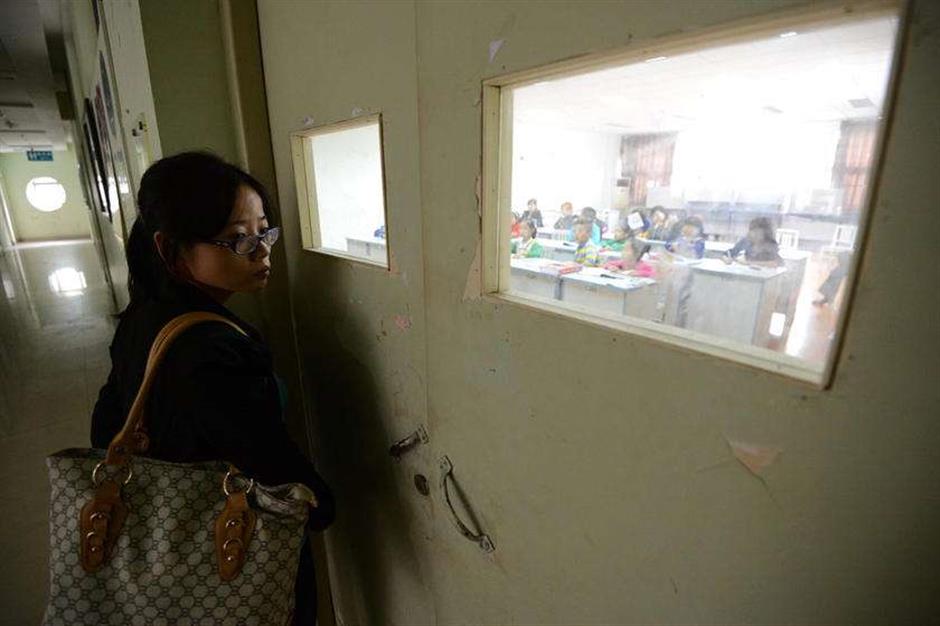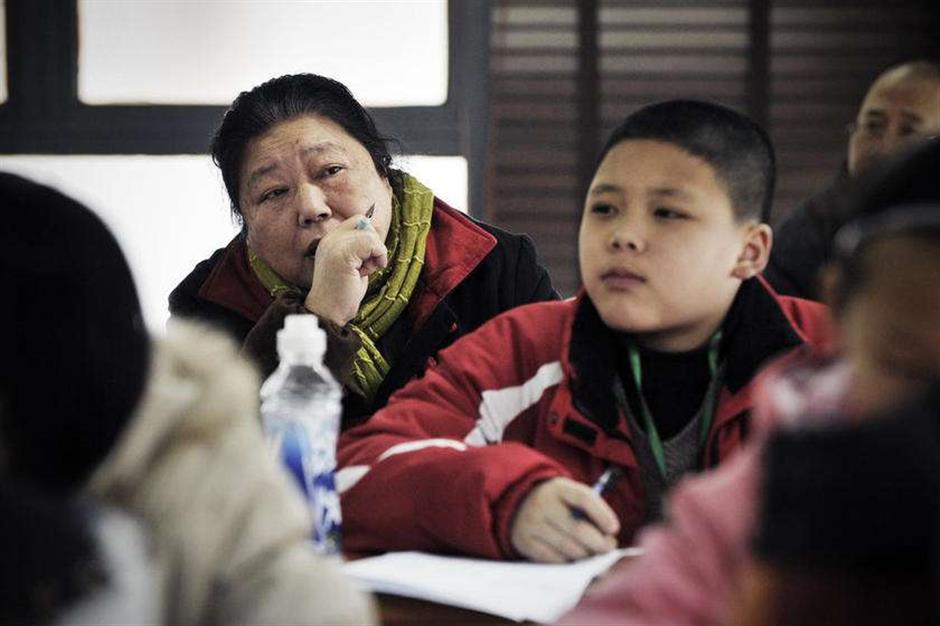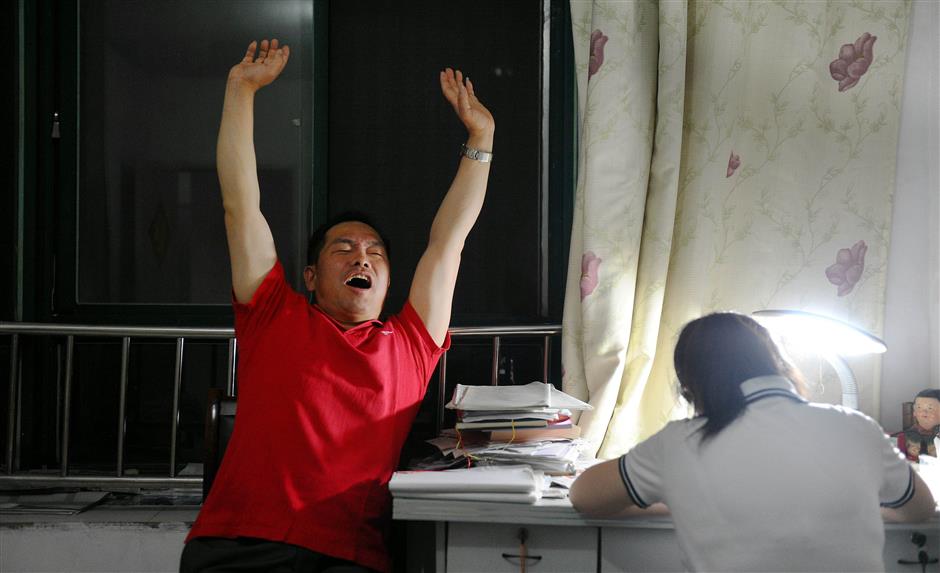Homework piles pressure on parents

A mother waiting outside classroom keeps an eye on her child.
Returning home from work at 7pm every evening, 36-year-old Wei Liqiu feels her day is just beginning. After dinner, she would have to deal with her 10-year-old son’s homework, reply to the teacher’s messages and prepare his school stuff for the next day.
The routine began when the boy entered primary school three years ago. Wei can’t even rest at weekends because she has to send him to training schools and attend classes with him.
“It seems I don’t have time to stop and catch my breath,” Wei says. “And I feel bad for my son too as I think he shoulders much larger pressure than I could imagine.”
Wei’s mindset is not unique among parents who worry about the academic pressure their children are under, but that worry may be misplaced, according to a recent study by the Shanghai Academy of Social Sciences.
Its survey of 8,000 families in the city showed that parents are actually more anxious about their children’s study than the children themselves.
“Children have their ways of releasing stress that parents might not aware of. Procrastination or even just being absent-minded while doing homework is among their coping methods,” Yang Xiong, director of the academy’s Juvenile Study Institute, told a recent forum in the city on children’s lifestyles.
The anxiety stems from too high expectations, Yang says. For example, half the surveyed parents hoped their children’s scores could beat 95 percent of their classmates, while 90 percent of parents hoped their children would gain at least a bachelor’s degree.
The survey also revealed that fathers are happier about parenthood than mothers.
“Probably it is because mothers have a stronger biological bond with the children,” says Yang. “Therefore, mothers usually have more expectations for the future of the children than fathers, and they would be more worried and anxious.”
Wei is a typical example. A graduate from Shanghai University and working as a saleswoman, she believes her child needs to be at the top of the class in primary, junior and senior high school, or he wouldn’t be able to go to a better university than she did.
“I didn’t do well during my school years and I hope that my son wouldn’t repeat my failure,” she says.

Wei’s husband, who works for the same company as Wei, is more easygoing about his son’s education.
“He believes teachers should take full responsibility for children’s study,” says Wei. “He doesn’t care about how our son’s homework is done, and we’ve had several fights about it.”
Wei says that from time to time she suffered some symptoms of anxiety, such as insomnia and rapid heartbeat, but she never went to the doctor.
Parents with a higher educational background and a more successful career are not free from such anxieties, either. The survey showed that parents with higher incomes had higher expectations for their children as they hoped they would emulate their success.
Jasmine Li, who owns a travel service company with her husband, designed a life path for her two daughters even before they were born. They would go to expensive bilingual schools that provided US or UK courses and then study abroad after graduating from junior high school, despite what that might cost.
“Social resources are limited, and if we can’t provide the best for our children, they would be left behind by others,” Li says.
Li says society has changed so fast that she feels no matter how hard they tried, their children still couldn't keep up.
“For example, just several years ago, children from wealthy families would learn to play golf or tennis, but now equestrianism is popular,” she says.
Researcher Yang says the prevailing anxiety of Chinese parents comes from singular social values.
“People believe that a successful life means to graduate from a top-class university, to obtain a high position in the workplace and to earn a great amount of money,” he says. “If this kind of single-minded focus doesn’t change, then parents, as well as the whole society, can’t be free from anxiety.”
Yang suggests parents study positive psychology to find happiness in things other than social status or money.
“We need to learn to just be ordinary people,” he says. “Happiness comes from cognitive change rather than chasing endless goals or comparing with other people.”

A father yawns while accompanying his daughter doing her homework late into the night.
Parents who do homework with their children
Doing homework is not just the student’s job anymore. A recent online survey by education website afanti001.com showed that 78 percent of Chinese parents of primary and junior high school students would do homework with their children.
The website said the survey targeted millions of its users from all over the country. It showed that Chinese students spend nearly three hours a day on homework, which means the whole family would use nearly all their time between dinner and sleep on homework.
Tough homework caused some serious issues. About 75 percent of interviewees said they had fought with their children over math problems or text recitations.
But that intense parent-child relationship is not the most urgent issue.
Recently an article “How I Spent Time with My Child Doing Homework and Ended Up in the Hospital” was widely spread online and stroke a chord with parents.
The article, claiming to be a real-life story, said a mother suffered from cerebral hemorrhage after she lost her temper with her child on homework. While a father complained that he had a heart attack, and two stents had to be placed in a blood vessel, something he felt was the result of doing homework with his child every evening for five years.
The veracity of the article is another story, but the emotions it provoked among parents were very real.
“I do feel that doing homework with my son is bad for both of our health, and I would lose my temper after I explain a math problem time and time again and he still doesn’t get it,” says Jennifer Zhang, mother of a 9-year-old son. “But if I don’t keep an eye on him, he would never finish his homework on time.”
Parents complain that teachers assign homework that is too much and too difficult.
“The school says students need all-round development, so my son often comes home with very complicated homework, such as making a newspaper from scratch or doing handiworks with vegetables,” says Zhang. “It feels like that I have a second job after work helping him with all those weird tasks.”















